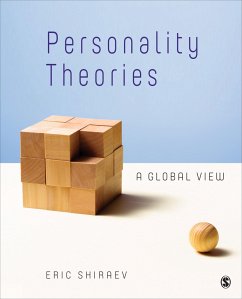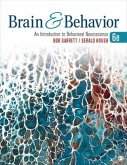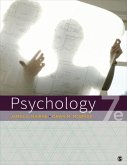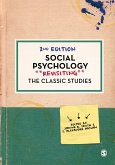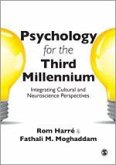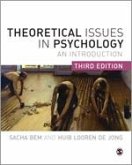- Gebundenes Buch
- Merkliste
- Auf die Merkliste
- Bewerten Bewerten
- Teilen
- Produkt teilen
- Produkterinnerung
- Produkterinnerung
Personality Theories: A Global ViewWhere did they come from? How did they study facts? How do we apply them now? chronologicalcomprehensive
Andere Kunden interessierten sich auch für
![A History of Psychology A History of Psychology]() Eric ShiraevA History of Psychology183,99 €
Eric ShiraevA History of Psychology183,99 €![Essentials of Psychology Essentials of Psychology]() Saul KassinEssentials of Psychology145,99 €
Saul KassinEssentials of Psychology145,99 €![Brain & Behavior Brain & Behavior]() Bob GarrettBrain & Behavior145,99 €
Bob GarrettBrain & Behavior145,99 €![Psychology Psychology]() James S NairnePsychology182,99 €
James S NairnePsychology182,99 €![Social Psychology Social Psychology]() Social Psychology116,99 €
Social Psychology116,99 €![Psychology for the Third Millennium Psychology for the Third Millennium]() Psychology for the Third Millennium222,99 €
Psychology for the Third Millennium222,99 €![Theoretical Issues in Psychology Theoretical Issues in Psychology]() Sacha BemTheoretical Issues in Psychology213,99 €
Sacha BemTheoretical Issues in Psychology213,99 €-
Personality Theories: A Global ViewWhere did they come from? How did they study facts? How do we apply them now? chronologicalcomprehensive
Produktdetails
- Produktdetails
- Verlag: Sage Publications UK
- Seitenzahl: 536
- Erscheinungstermin: 13. Oktober 2016
- Englisch
- Abmessung: 234mm x 185mm x 33mm
- Gewicht: 1043g
- ISBN-13: 9781452268576
- ISBN-10: 1452268576
- Artikelnr.: 44972150
- Herstellerkennzeichnung
- Libri GmbH
- Europaallee 1
- 36244 Bad Hersfeld
- gpsr@libri.de
- Verlag: Sage Publications UK
- Seitenzahl: 536
- Erscheinungstermin: 13. Oktober 2016
- Englisch
- Abmessung: 234mm x 185mm x 33mm
- Gewicht: 1043g
- ISBN-13: 9781452268576
- ISBN-10: 1452268576
- Artikelnr.: 44972150
- Herstellerkennzeichnung
- Libri GmbH
- Europaallee 1
- 36244 Bad Hersfeld
- gpsr@libri.de
Eric B. Shiraev is a professor and researcher at George Mason University. He received his PhD in political psychology from St Petersburg University, Russia, and completed a post-doctoral program at University of California, Los Angeles. He has extensive teaching and research experience at a number of distinguished universities both in the United States and abroad. Shiraev is the author, co-author, and/or co-editor of fourteen books and numerous publications in the fields of cross-cultural psychology, political psychology, and comparative studies. In addition to his teaching and scholarly pursuits, he also writes opinion essays for think-tanks, nongovernment organizations, and the media. Shiraev's research interests include: history of science, comparative history of psychology, cross-cultural psychology, historical theories of abnormal behavior, political psychology, folk beliefs, scientific foundations of spirituality, and psychology of social adjustment and immigration.
Chapter 1: Introducing Personality
Identifying personality
Approaching Personality
Applying Knowledge About Personality
Chapter 2: Scientific Foundations
Science and the Scientific Method
Influences on the Study of Personality
How do we Apply Knowledge?
Chapter 3: Research Methods
Personality Research Methods
How Do We Prepare and Conduct Research?
Applying Critical Thinking to Research Methods
Chapter 4: The Psychoanalytic Tradition
The Essence of The Psychoanalytic Tradition
Discussing The Psychoanalytic Tradition
Applying The Psychoanalytic Tradition
Chapter 5: The New Wave in the Psychoanalytic Tradition
Psychoanalysis and Society
Theoretical Expansions: Ego Psychology
Theoretical Expansions: Away From the Libido Concept
Psychoanalysis and Social Behavior
Contributions of the "New Wave" Psychoanalysts
Applying the Psychoanalysis of the "New Wave"
Chapter 6: The Behavioral-Learning Tradition
The Behavioral-Learning Tradition
Understanding Personality by Studying Animal Behavior
Studying Reflexes
Watson: Studying and Applying Behaviorism
Studying Behavior From Different Angles
Optimistic Behaviorism of B. F. Skinner
Social Learning Theory
What Behaviorism Accomplished and What it Missed
Applying the Behavioral-Learning Tradition
Chapter 7: The Trait Tradition
The Trait Approach
Trait Theorists and Perspectives
The Big Five
Humanities and Personality Traits
A Cross-Cultural Approach to Personality
Applying the Trait Tradition
Chapter 8: The Cognitive Tradition
The Roots of the Cognitive Tradition: Early Psychology
Cognitive Science
Psychology and Cognitive Science
Studies of Attitudes
The Personal Constructs Approach
Culture and the Self
Literature and the Inner World
Applying the Cognitive Tradition
Chapter 9: The Humanistic Tradition
The Humanistic Tradition: Social Contexts
The Essence of Humanistic Tradition
Principles of Humanistic Psychology
Key Figures and Influences in the Humanistic Tradition
Existentialism
Abraham Maslow and Humanistic Psychology
The Autotelic Personality
Humanistic Tradition and Activism
Carl Rogers and the Person-Centered Approach
Positive Psychology
Accomplishments and Limitations of the Humanistic Tradition
Applying the Humanistic Tradition
Chapter 10: The Developmental Domain
The Essence of the Developmental Domain
Studying The Developmental Domain
Applying the Developmental Domain
Chapter 11: The Gender Domain
The Essence of the Gender Domain
Traditional Views of the Sexes
Evolving Views of the Sexes
Traditional Views of Gender
Evolving Views of Gender
Traditional Views of Sexual Orientation
Evolving Views of Sexual Orientation
Applying the Gender Domain
Chapter 12: The Clinical Domain
The Essence of the Clinical Domain
Diagnosing Personality Disorders
Classification and Description of Personality Disorders
Cluster: Odd and Eccentric Behavior
Cluster: Dramatic, Emotional, or Erratic Behavior
Cluster: Anxious and Fearful Behavior
Etiology of Personality Disorders
Differential Diagnosis and Comorbidity
Applying Knowledge to the Clinical Domain
Chapter 13. Personality: The Adjustment Domain
The Essence of Adjustment and Coping
Areas of Change Requiring Coping and Adjustment
Types of Coping and Adjustment
Identifying "Helpful" Personality Traits
Outcomes of Coping and Adjustment
Traits That Negatively Affect the Coping Process
Identifying Adaptive Coping Strategies
Identifying Maladaptive Strategies
Applying the Adjustment Domain
Chapter 14. Personality Theories in the 21st Century
Case 1: "Hacking" Living Cells for a Good Cause
Case 2: Understanding Multimorbidity
Case 3: Height, Masculinity, and Self-Esteem
Case 4: A Personality Profile of the Internet Troll
Understanding an Individual's Personality
Identifying personality
Approaching Personality
Applying Knowledge About Personality
Chapter 2: Scientific Foundations
Science and the Scientific Method
Influences on the Study of Personality
How do we Apply Knowledge?
Chapter 3: Research Methods
Personality Research Methods
How Do We Prepare and Conduct Research?
Applying Critical Thinking to Research Methods
Chapter 4: The Psychoanalytic Tradition
The Essence of The Psychoanalytic Tradition
Discussing The Psychoanalytic Tradition
Applying The Psychoanalytic Tradition
Chapter 5: The New Wave in the Psychoanalytic Tradition
Psychoanalysis and Society
Theoretical Expansions: Ego Psychology
Theoretical Expansions: Away From the Libido Concept
Psychoanalysis and Social Behavior
Contributions of the "New Wave" Psychoanalysts
Applying the Psychoanalysis of the "New Wave"
Chapter 6: The Behavioral-Learning Tradition
The Behavioral-Learning Tradition
Understanding Personality by Studying Animal Behavior
Studying Reflexes
Watson: Studying and Applying Behaviorism
Studying Behavior From Different Angles
Optimistic Behaviorism of B. F. Skinner
Social Learning Theory
What Behaviorism Accomplished and What it Missed
Applying the Behavioral-Learning Tradition
Chapter 7: The Trait Tradition
The Trait Approach
Trait Theorists and Perspectives
The Big Five
Humanities and Personality Traits
A Cross-Cultural Approach to Personality
Applying the Trait Tradition
Chapter 8: The Cognitive Tradition
The Roots of the Cognitive Tradition: Early Psychology
Cognitive Science
Psychology and Cognitive Science
Studies of Attitudes
The Personal Constructs Approach
Culture and the Self
Literature and the Inner World
Applying the Cognitive Tradition
Chapter 9: The Humanistic Tradition
The Humanistic Tradition: Social Contexts
The Essence of Humanistic Tradition
Principles of Humanistic Psychology
Key Figures and Influences in the Humanistic Tradition
Existentialism
Abraham Maslow and Humanistic Psychology
The Autotelic Personality
Humanistic Tradition and Activism
Carl Rogers and the Person-Centered Approach
Positive Psychology
Accomplishments and Limitations of the Humanistic Tradition
Applying the Humanistic Tradition
Chapter 10: The Developmental Domain
The Essence of the Developmental Domain
Studying The Developmental Domain
Applying the Developmental Domain
Chapter 11: The Gender Domain
The Essence of the Gender Domain
Traditional Views of the Sexes
Evolving Views of the Sexes
Traditional Views of Gender
Evolving Views of Gender
Traditional Views of Sexual Orientation
Evolving Views of Sexual Orientation
Applying the Gender Domain
Chapter 12: The Clinical Domain
The Essence of the Clinical Domain
Diagnosing Personality Disorders
Classification and Description of Personality Disorders
Cluster: Odd and Eccentric Behavior
Cluster: Dramatic, Emotional, or Erratic Behavior
Cluster: Anxious and Fearful Behavior
Etiology of Personality Disorders
Differential Diagnosis and Comorbidity
Applying Knowledge to the Clinical Domain
Chapter 13. Personality: The Adjustment Domain
The Essence of Adjustment and Coping
Areas of Change Requiring Coping and Adjustment
Types of Coping and Adjustment
Identifying "Helpful" Personality Traits
Outcomes of Coping and Adjustment
Traits That Negatively Affect the Coping Process
Identifying Adaptive Coping Strategies
Identifying Maladaptive Strategies
Applying the Adjustment Domain
Chapter 14. Personality Theories in the 21st Century
Case 1: "Hacking" Living Cells for a Good Cause
Case 2: Understanding Multimorbidity
Case 3: Height, Masculinity, and Self-Esteem
Case 4: A Personality Profile of the Internet Troll
Understanding an Individual's Personality
Chapter 1: Introducing Personality
Identifying personality
Approaching Personality
Applying Knowledge About Personality
Chapter 2: Scientific Foundations
Science and the Scientific Method
Influences on the Study of Personality
How do we Apply Knowledge?
Chapter 3: Research Methods
Personality Research Methods
How Do We Prepare and Conduct Research?
Applying Critical Thinking to Research Methods
Chapter 4: The Psychoanalytic Tradition
The Essence of The Psychoanalytic Tradition
Discussing The Psychoanalytic Tradition
Applying The Psychoanalytic Tradition
Chapter 5: The New Wave in the Psychoanalytic Tradition
Psychoanalysis and Society
Theoretical Expansions: Ego Psychology
Theoretical Expansions: Away From the Libido Concept
Psychoanalysis and Social Behavior
Contributions of the "New Wave" Psychoanalysts
Applying the Psychoanalysis of the "New Wave"
Chapter 6: The Behavioral-Learning Tradition
The Behavioral-Learning Tradition
Understanding Personality by Studying Animal Behavior
Studying Reflexes
Watson: Studying and Applying Behaviorism
Studying Behavior From Different Angles
Optimistic Behaviorism of B. F. Skinner
Social Learning Theory
What Behaviorism Accomplished and What it Missed
Applying the Behavioral-Learning Tradition
Chapter 7: The Trait Tradition
The Trait Approach
Trait Theorists and Perspectives
The Big Five
Humanities and Personality Traits
A Cross-Cultural Approach to Personality
Applying the Trait Tradition
Chapter 8: The Cognitive Tradition
The Roots of the Cognitive Tradition: Early Psychology
Cognitive Science
Psychology and Cognitive Science
Studies of Attitudes
The Personal Constructs Approach
Culture and the Self
Literature and the Inner World
Applying the Cognitive Tradition
Chapter 9: The Humanistic Tradition
The Humanistic Tradition: Social Contexts
The Essence of Humanistic Tradition
Principles of Humanistic Psychology
Key Figures and Influences in the Humanistic Tradition
Existentialism
Abraham Maslow and Humanistic Psychology
The Autotelic Personality
Humanistic Tradition and Activism
Carl Rogers and the Person-Centered Approach
Positive Psychology
Accomplishments and Limitations of the Humanistic Tradition
Applying the Humanistic Tradition
Chapter 10: The Developmental Domain
The Essence of the Developmental Domain
Studying The Developmental Domain
Applying the Developmental Domain
Chapter 11: The Gender Domain
The Essence of the Gender Domain
Traditional Views of the Sexes
Evolving Views of the Sexes
Traditional Views of Gender
Evolving Views of Gender
Traditional Views of Sexual Orientation
Evolving Views of Sexual Orientation
Applying the Gender Domain
Chapter 12: The Clinical Domain
The Essence of the Clinical Domain
Diagnosing Personality Disorders
Classification and Description of Personality Disorders
Cluster: Odd and Eccentric Behavior
Cluster: Dramatic, Emotional, or Erratic Behavior
Cluster: Anxious and Fearful Behavior
Etiology of Personality Disorders
Differential Diagnosis and Comorbidity
Applying Knowledge to the Clinical Domain
Chapter 13. Personality: The Adjustment Domain
The Essence of Adjustment and Coping
Areas of Change Requiring Coping and Adjustment
Types of Coping and Adjustment
Identifying "Helpful" Personality Traits
Outcomes of Coping and Adjustment
Traits That Negatively Affect the Coping Process
Identifying Adaptive Coping Strategies
Identifying Maladaptive Strategies
Applying the Adjustment Domain
Chapter 14. Personality Theories in the 21st Century
Case 1: "Hacking" Living Cells for a Good Cause
Case 2: Understanding Multimorbidity
Case 3: Height, Masculinity, and Self-Esteem
Case 4: A Personality Profile of the Internet Troll
Understanding an Individual's Personality
Identifying personality
Approaching Personality
Applying Knowledge About Personality
Chapter 2: Scientific Foundations
Science and the Scientific Method
Influences on the Study of Personality
How do we Apply Knowledge?
Chapter 3: Research Methods
Personality Research Methods
How Do We Prepare and Conduct Research?
Applying Critical Thinking to Research Methods
Chapter 4: The Psychoanalytic Tradition
The Essence of The Psychoanalytic Tradition
Discussing The Psychoanalytic Tradition
Applying The Psychoanalytic Tradition
Chapter 5: The New Wave in the Psychoanalytic Tradition
Psychoanalysis and Society
Theoretical Expansions: Ego Psychology
Theoretical Expansions: Away From the Libido Concept
Psychoanalysis and Social Behavior
Contributions of the "New Wave" Psychoanalysts
Applying the Psychoanalysis of the "New Wave"
Chapter 6: The Behavioral-Learning Tradition
The Behavioral-Learning Tradition
Understanding Personality by Studying Animal Behavior
Studying Reflexes
Watson: Studying and Applying Behaviorism
Studying Behavior From Different Angles
Optimistic Behaviorism of B. F. Skinner
Social Learning Theory
What Behaviorism Accomplished and What it Missed
Applying the Behavioral-Learning Tradition
Chapter 7: The Trait Tradition
The Trait Approach
Trait Theorists and Perspectives
The Big Five
Humanities and Personality Traits
A Cross-Cultural Approach to Personality
Applying the Trait Tradition
Chapter 8: The Cognitive Tradition
The Roots of the Cognitive Tradition: Early Psychology
Cognitive Science
Psychology and Cognitive Science
Studies of Attitudes
The Personal Constructs Approach
Culture and the Self
Literature and the Inner World
Applying the Cognitive Tradition
Chapter 9: The Humanistic Tradition
The Humanistic Tradition: Social Contexts
The Essence of Humanistic Tradition
Principles of Humanistic Psychology
Key Figures and Influences in the Humanistic Tradition
Existentialism
Abraham Maslow and Humanistic Psychology
The Autotelic Personality
Humanistic Tradition and Activism
Carl Rogers and the Person-Centered Approach
Positive Psychology
Accomplishments and Limitations of the Humanistic Tradition
Applying the Humanistic Tradition
Chapter 10: The Developmental Domain
The Essence of the Developmental Domain
Studying The Developmental Domain
Applying the Developmental Domain
Chapter 11: The Gender Domain
The Essence of the Gender Domain
Traditional Views of the Sexes
Evolving Views of the Sexes
Traditional Views of Gender
Evolving Views of Gender
Traditional Views of Sexual Orientation
Evolving Views of Sexual Orientation
Applying the Gender Domain
Chapter 12: The Clinical Domain
The Essence of the Clinical Domain
Diagnosing Personality Disorders
Classification and Description of Personality Disorders
Cluster: Odd and Eccentric Behavior
Cluster: Dramatic, Emotional, or Erratic Behavior
Cluster: Anxious and Fearful Behavior
Etiology of Personality Disorders
Differential Diagnosis and Comorbidity
Applying Knowledge to the Clinical Domain
Chapter 13. Personality: The Adjustment Domain
The Essence of Adjustment and Coping
Areas of Change Requiring Coping and Adjustment
Types of Coping and Adjustment
Identifying "Helpful" Personality Traits
Outcomes of Coping and Adjustment
Traits That Negatively Affect the Coping Process
Identifying Adaptive Coping Strategies
Identifying Maladaptive Strategies
Applying the Adjustment Domain
Chapter 14. Personality Theories in the 21st Century
Case 1: "Hacking" Living Cells for a Good Cause
Case 2: Understanding Multimorbidity
Case 3: Height, Masculinity, and Self-Esteem
Case 4: A Personality Profile of the Internet Troll
Understanding an Individual's Personality

